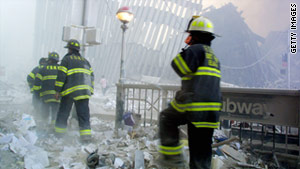A compromise bill to provide free medical treatment and compensation to first responders of the September 11, 2001, terrorist attack won final approval Wednesday from the House and Senate, sending it to President Barack Obama to be signed into law.
The bill passed on a voice vote in the Senate, and then on a 206-60 vote in the House on the final day of the lame-duck session of Congress.
Jubilant Democrats hailed the last-minute approval as a $4.2 billion triumph for firefighters, police officers and other emergency personnel who put themselves in harm's way to help others in the aftermath of the 2001 terrorist attack.
Even though the vote was kept open for more than an hour, 168 House members did not participate. Missing were 89 Republicans, including incoming Speaker John Boehner, and 79 Democrats.



